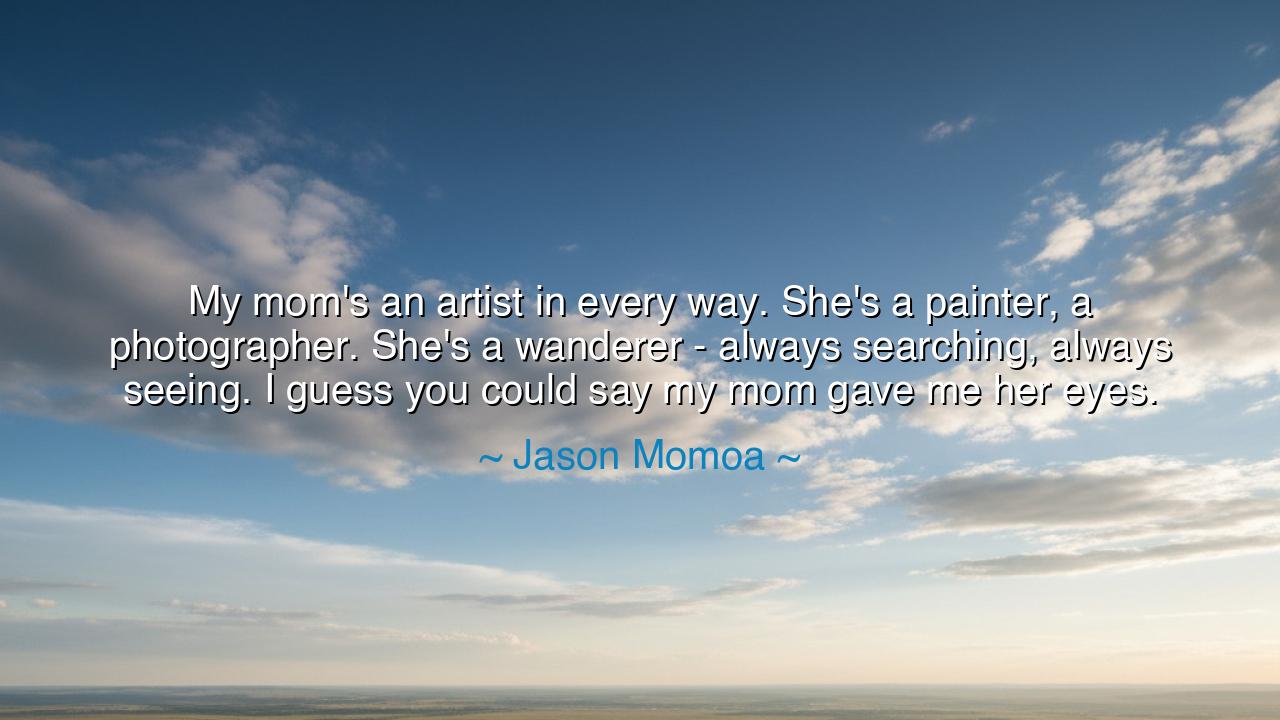
My mom's an artist in every way. She's a painter, a photographer.
My mom's an artist in every way. She's a painter, a photographer. She's a wanderer - always searching, always seeing. I guess you could say my mom gave me her eyes.






Hear the words of Jason Momoa, who spoke with reverence for the one who shaped his vision: “My mom’s an artist in every way. She’s a painter, a photographer. She’s a wanderer—always searching, always seeing. I guess you could say my mom gave me her eyes.” These words, though tender, carry the weight of ancient truth—that what parents pass to their children is not only blood and bone, but also vision, the way of seeing the world, the lens through which beauty and meaning are revealed.
To call his mom an artist is not only to describe her craft, but her spirit. For artistry is more than the stroke of brush or the click of a shutter. It is the restless soul of the wanderer, forever searching, forever open to what others pass by. She did not merely create pictures; she trained her son to see. To be given her eyes is to inherit her way of perceiving wonder where others find nothing, of noticing light in shadow, of discovering story in the smallest of things.
The ancients knew well that to “see” is the root of wisdom. The prophet does not merely speak but sees visions; the philosopher is not one who hears but one who perceives truth beyond appearances. In Homer’s Odyssey, Tiresias the blind seer had no sight, yet his eyes were keener than most, for he saw into the heart of destiny. In the same way, Momoa’s mother gave him not just the tools of art, but the deeper sight of the heart—an inheritance greater than wealth or land.
Consider the story of Leonardo da Vinci, whose notebooks were filled not only with paintings, but with endless sketches of plants, machines, rivers, and faces. His genius was not born of talent alone, but of his eyes—the way he looked upon the world with unceasing curiosity. In Jason Momoa’s words, we glimpse the same lineage: a mother who, like Leonardo, looked always with wonder, and a son who inherited not only her gaze but her hunger for discovery.
Yet there is more than artistry here—there is the sacred bond of mother and child. To say, “She gave me her eyes,” is to confess that his very way of engaging with life is a continuation of her being. This is a truth older than memory: that children live as extensions of their parents’ dreams, that the seeds sown in one life blossom in another. Thus, the artist-mother lives on in the artist-son, even if his canvas is not paint or film but the roles he inhabits and the worlds he brings to life.
The lesson is clear: each of us has been given “eyes” by those who came before. Our parents, our teachers, our elders—each has taught us to see in a certain way, to notice what they valued, to frame the world with their perspective. Some of these eyes bring beauty; others, sorrow. But once we recognize them, we may choose whether to carry them forward, to refine them, or to replace them with a clearer vision of our own.
Therefore, let all who hear take this counsel: cherish the vision you have inherited, but do not leave it idle. If your elders gave you eyes that see beauty, nurture that gift. If they gave you eyes clouded by fear or bitterness, seek to clear them. Be like the wanderer, “always searching, always seeing,” for the world has endless wonders for those who dare to look.
Thus, the teaching endures: the greatest gift is not wealth, but sight—the ability to see beauty, meaning, and truth. Jason Momoa honors his mom by living through the eyes she gave him, and in so doing, he reminds us that we too are heirs of vision. May we use our own sight not only to behold the world, but to create, to honor, and to pass on new eyes to those who come after us.






AAdministratorAdministrator
Welcome, honored guests. Please leave a comment, we will respond soon